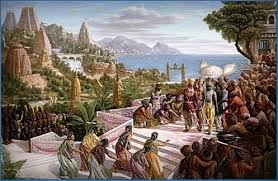I read with interest what Mr Arun Jaitley, the new finance minister of India, said in his budget speech, and tried to compare his statements with Srila Prabhupada’s teachings on creating and maintaining a strong economy. What I found is, neither Mr Jaitley nor any other finance minister in the past that I have seen, is any match to Srila Prabhupada’s down-to-earth genius in the field of economics. Read on to find out why I say this.
Here is what Mr Jaitley said in a speech (Read ):
- Two years of sub-five per cent growth has led to challenges to the economy
- Green shoots of recovery seen in global economy
- Slow decision making has resulted in loss of opportunity
- Should we allow economy to suffer because of indecisiveness and populism, he asks.
I noticed that the above four statements are pointed at the previous government.
The following are the promises:
- We look forward lower level of inflation
- Will usher in policy regime that will usher in higher growth, low inflation
- Aim to achieve 7-8 per cent economic growth rate in next 3-4 years
- Will leave no stone unturned to create a vibrant India
- Anti-poverty programmes will be targeted well.
- Expenditure Management Commission will be constituted to look at expenditure reforms
- We are for minimum government, maximum governance
- Overall subsidy regime will be reviewed, especially food and oil. Marginalised sections and SC/ST to be protected
- New urea policy will be formulated
- This govt will not ordinarily change policies retrospectively which creates a fresh liability
- We are committed to providing stable tax regime which is investor friendly
- Govt to set up a high-level Committee to interact with industry to bring about changes in tax laws if required
- Proposes to enhance the scope of income tax settlement commission.
- Proposes to strengthen authority for advance ruling in tax, set up more benches
He also said what needs be done:
- We must address the problem of black money fully
- We must take bold steps to enhance economic activity
- We have no option but to take some bold steps to spurt economy; these are only the first steps and are directional
- We need to revive growth particularly in manufacturing sector and infrastructure
- There is urgent need to generate more resources
- Task before us is challenging
- We must continue to be watchful of CAD
- Target of 4.1 per cent fiscal deficit is daunting but accepting it as a challenge
- Emphasize on fiscal prudence.
- Need to generate more resources.
He thinks that financial stability is foundation of rapid recovery, and that India’s domestic manufacturing is still at nascent stage
Agreeably, all that he said make sense. Any smart FM or economist would say similar things, and we have no intention to debate on it here. They have “figured out” how to increase income and control expenses. For them, happiness is achieved by wealth, and wealth is achieved by a specific mechanism. They call it Economics.
Now let us see what Srila Prabhupada said about economics.
In a lecture in Fiji on 24th May, 1975:
Nowadays they are facing a scarcity of food. The solution is there in the Bhagavad-gita. Krishna says, annad bhavanti bhutani: “Bhutani, all living entities, both animal and man, they can live very nicely without any anxiety provided they have got sufficient food grains.” Now what is your objection to this? This is the solution. Krishna says, annad bhavanti bhutani. So it is not utopian; it is practical. You must have sufficient food grain to feed the human being and the animal, and everything will be peaceful immediately. Because people, if one become hungry, he is disturbed. So give him food first of all. That is Krishna’s injunction. Is that very impossible, impractical? No. You grow food more and distribute. So much land is there, but we are not growing food. We are growing or busy in manufacturing tools and motor tires. Then now eat motor tires. But Krishna says that “You grow anna.” Then there is no question of scarcity. Annad bhavanti bhutani.
In the Teachings of Queen Kunti 18:
It is by ignorance that people think that by opening factories they will be happy. Why should they open factories? There is no need. There is so much land, and one can produce one’s own food grains and eat sumptuously without any factory. Milk is also available without a factory. The factory cannot produce milk or grains. The present scarcity of food in the world is largely due to such factories. When everyone is working in the city to produce nuts and bolts, who will produce food grains? Simple living and high thinking is the solution to economic problems.

In a discussion with Allen Ginsberg on May 11, 1969 in Columbus, Ohio:
From economic point of view, if one man has got a cow and four acres of land, he has no economic problem. He can independently live in any part of the world. Simply he must (have) one cow and four acres of land. Let the people be divided with four acres of land and a cow, there will be no economic question. All the factories will be closed…
And, in a lecture on October 15, 1974 in Sridham Mayapur, again referring to the same verse from Bhagavad Gita:
Here it is said that avidya-kama-karmabhih. By ignorance, they are thinking by opening factories they will be happy. That is avidya. He does not know that this is ignorance. Why you should open factory? This is called ugra-karma. There is no need of opening factory. You have got land. Here are so many lands. You produce your food grains. Annad bhavanti bhutani. You eat sumptuously food grain, milk, and that will be available without any factory. The factory cannot produce milk or food grain. The present scarcity of foodstuff means everybody is engaged in the city, producing bolts and nuts. Who is producing food grain? This is the solution of economic problem. Annad bhavanti bhutani…
The main difference between what the Finance Minister said and what Srila Prabhupada said is this: 1) Srila Prabhupada does not blame others; 2) He does not give lofty promises; 3) He does not give his own opinion on the solution. Instead, he quotes Lord Krishna on what human beings should do.
One may ask, what has this to do with India’s budget? The answer is, Vedic wisdom does not deal with the symptoms, it deals with the causes. There is enough knowledge available in the Vedas about economics. According to Vedas, wealth, or artha, is to be achieved by the performance of dharma, or one’s occupational duties prescribed in the scriptures. Unfortunately in Kaliyuga, people have concocted their own ways for accumulating wealth, but such wealth simply entangles them more in the cycle of karmic reactions. I found the following explanation interesting:
“There is a link between economic activity and human consciousness. Economics is not a physical science like electromagnetism that works according to natural laws. It is a set of ideas entirely created by human beings. The most important side of the economic equation therefore, is the human side, but this side is totally neglected in all discussions of economics. Since economics is a man-made creation, if we want to understand the economic problem and its solution we must understand how and why human beings act in this world. That will give us the insight needed to properly adjust all of the parameters of the economic calculus to get the desired result. Employing the spiritual wisdom of the Bhagavad-gita, Spiritual Economics explains the behavior of spiritual beings living in a material world. This has everything to do with economic activity.”(Read more here.)

Modern economists think that by building factories and highways, they will create jobs and accelerate growth, but in reality, factories and machines leave thousands of people jobless. It takes many to manufacture a machine, but once it is manufactured it eats up many people’s daily wages. One party, i.e. the factory owners, becomes richer as they do not have to pay monthly wages, and the other party, i.e. the workers, become poorer for having lost their jobs. How such a mechanism can make the economy stronger and people happy in the long-term? Industries can make a few people rich, not the entire nation. The so-called development based on oil and electricity is fragile and can collapse at any time.

On the other hand, economics based on agriculture and cow protection has only benefits. Not only is it lasting but it is also peaceful. This is because it is based on following the instructions given by the creator of this world. People get jittery when we talk about the creator, or God, but God is an unavoidable fact. Today the biggest problem of the world is, it is lead by atheist class of people. They have miserably mixed up secularism with atheism. Sometimes the leaders want to be known as devotees of God and believers of the Bhagavad Gita, but when it comes to hearing God’s advice, they think it’s all mythology. Srila Prabhupada’s stand, however, is clear: “This is the solution. Krishna says, annad bhavanti bhutani. So it is not utopian; it is practical.”
If we believe that the Bhagavad Gita was indeed spoken, and if we claim to be its followers, then we ought to also unconditionally accept its teachings in full. There is no need to spend billions on constructing highways, factories, and nuclear plants for being prosperous. Villages of the past were naturally peaceful and economically more stable for they had all necessities of life available around them with enough time and wealth to eat, sleep and be happy – something that today’s people are hankering for. The additional advantage was, they also had the time and intelligence to think about their eternal existence, eternal wealth and eternal happiness.
Hare Krishna



























